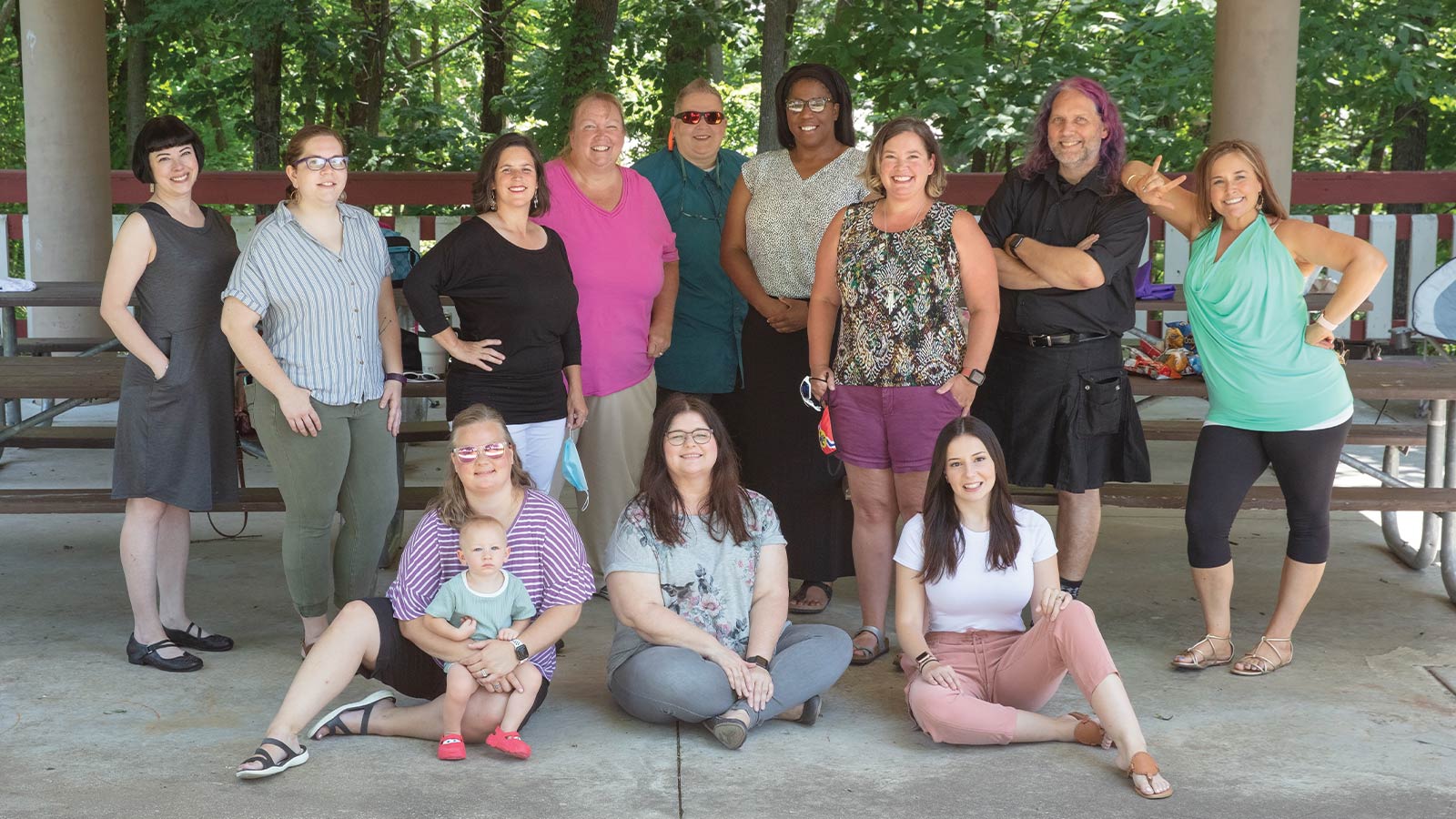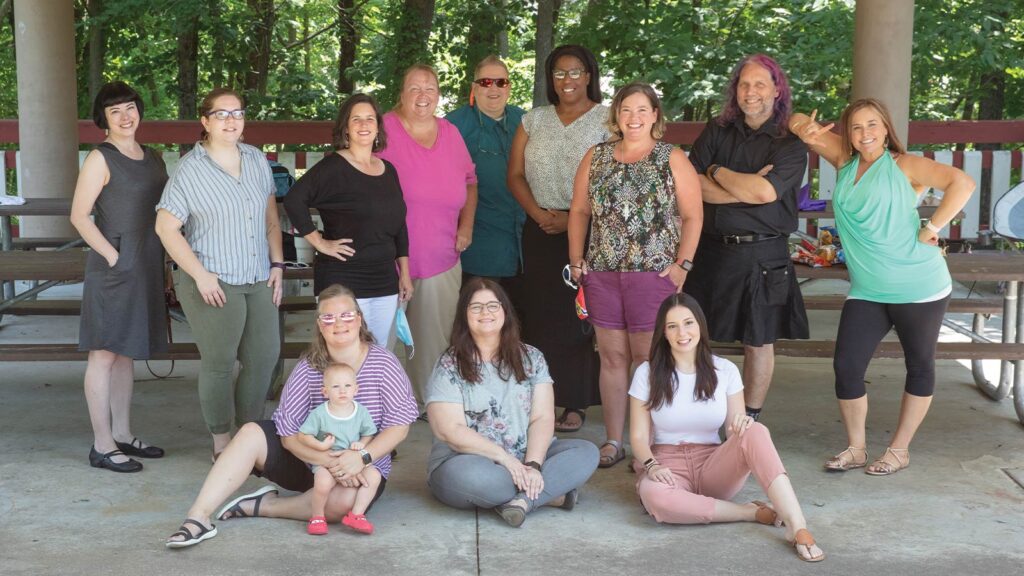
A Columbia nonprofit advocates for the deaf, hard of hearing, late-deafened, and deafblind.
As a child, Columbia local Dr. Stephanie Logan could not have imagined where her life was headed. “I still have to pinch myself every day when I wake up,” she says.
Stephanie is the mom of five beautiful children, the partner to an amazing wife, and the executive director of Columbia nonprofit DeafLEAD. “I have been privileged to work with the most incredible people, and collectively, they have changed my life.”
DeafLEAD exists to provide individuals who are deaf and hard of hearing with comprehensive, unified, and continuous support by enhancing socio-emotional development, effective communication, and leadership through education within the state of Missouri.
Beginning as a summer substance abuse prevention and education camp for deaf teens, DeafLEAD was able to grow into what it is today with the help of The Department of Mental Health and The Division of Alcohol and Drug Abuse. By providing the seed money to establish a nonprofit, these organizations gave DeafLEAD the ability to run the camp, while also providing crisis intervention and mental health services. These services are a constant theme for DeafLEAD, partially because of Stephanie’s staggering life story.
Stephanie’s Story
Like many in the deaf community, Stephanie’s journey has not been an easy one. At the age of 23, while attending the University of Georgia, Stephanie contracted spinal meningitis. A combination of the high fevers and medication resulted in a total hearing loss in both of her ears. “Up until that point in my life, I had never met a deaf person and I had never seen sign language. I was lost. I couldn’t lip read. I didn’t feel comfortable talking. It was like starting all over again learning how to communicate,” she says.
During this dramatic communication shift, Stephanie began going to speech therapy at Gallaudet University — a university for the deaf — in Washington, DC. At Gallaudet, she learned American Sign Language. “I went from being suicidal to thriving once I started learning ASL,” she says. Throughout this time in Stephanie’s life, she was also receiving specialized mental health services from a counselor focusing on deaf culture.
A few years after finishing her degree at the University of Georgia with the help of deaf interpreters, Stephanie applied for a job posting at a nonprofit agency serving the deaf — DeafLEAD — in Missouri. “I interviewed for the position and was offered it,” she says. “Once I got here, the agency consisted of one small room with nothing in it, and I was the first employee.”
Early on, Stephanie’s goal was to find funding to provide crisis intervention services statewide in the deaf community. “A major part of my first year at DeafLEAD was traveling across the state of Missouri and meeting with deaf, hard of hearing, late-deafened, and deafblind individuals and determining what they identified as the greatest needs that needed to be met,” Stephanie says. It took time to learn all the nuances of Missouri’s deaf community, but over time, she was better able to decipher what was essential and needed from DeafLEAD.
DeafLEAD has gone from one employee to nine employees in both Columbia and St. Louis. Currently, they provide crisis intervention services along with mental health services personal, legal, and medical advocacy; a crisis hotline and texting services; video call crisis services; crisis interpreting services; technical assistance; information and referral; and programming for deaf youth centered around drug and alcohol prevention and awareness. “Perhaps most importantly, we are given the privilege to stand with individuals as they make difficult choices for themselves and their families,” adds Stephanie.
Making an Impact Now and Forever
During the COVID-19 pandemic, DeafLEAD has worked hard to ensure its services continue to be as accessible as ever — if not even more so. “We have provided education about COVID-19, self-care, and meeting the mental health needs in ASL to the deaf community, and we have used social media as a platform for folks to access that education,” Stephanie says. The pandemic may be disrupting the world, but DeafLEAD has maintained consistency in its services. “I continue to see the impact every day in the lives of our consumers, the volunteers, the part-time and full-time staff, and our families.”
Stephanie has heaps of plans for DeafLEAD in the coming years. “I work to be open to what is the greatest need in the community,” she says. “I really want to expand our interpreting services for deaf victims of crime. One of the greatest barriers for deaf individuals receiving services when they’re victims of crime is the communication barrier. Often, nonprofit organizations cannot afford to hire interpreters to meet the needs of the individuals they are serving.”
DeafLEAD has changed countless lives, including Stephanie’s. Recently, Stephanie celebrated 25 years with DeafLEAD. As she reflects on the past quarter-century, she says, “I can’t stop thinking about all of the amazing people I’ve had the privilege to work with and the services that have been able to be provided through DeafLEAD.”
This organization looks the way it does today due to a deep personal trauma in Stephanie’s life. Remarkably, she has taken that trauma and turned it into a platform to defend the vulnerable. “What I once believed was the worst thing that could have ever happened to me turned out to be the greatest blessing,” she says.

Front row, left to right: Wendy Logan, Charlie Logan, Teresa Brisley, Nicole Hohlt
DeafLEAD
2505 W Ash St
573-445-5005
deafinc.org/deaflead/
Additional Information
Mission Statement: DeafLEAD exists to provide individuals who are deaf and hard of hearing with comprehensive, unified, and continuous support by enhancing socio-emotional development, effective communication, and leadership through education within the state of Missouri.
Founded: 1995
Board of Directors of DeafLEAD:
Tricia Garcia
Board President
Chris Fulcher
Vice President
Kim Williams
Secretary
Kristin Rugen
Treasurer
Angela Howard
Tec Chapman
Megan Steen
Quin Gresham
Sharon Liebman
Hans Liedtke
Staff of DeafLEAD:
Dr. Stephanie Logan
Executive Director
Becky Beck
Clinical Services Coordinator
Teresa Brisley
Crisis Line Coordinator
Wendy Logan
Volunteer Coordinator
Tyler Hannsz
Online Crisis Services Coordinator
Ashley Pappineau
Social Worker
Cory Rickabaugh
Crisis Interpreter and Case Manager
Heidi Rich
Crisis Interpreter and Case Manager
Corinne Liedtke
Crisis Interpreter and Case Manager
Stephanie Taksel
St Louis Services Coordinator/Social Worker
Beatrice Church
St Louis Victim Advocate
Justina Kent
Crisis Pager Manager
Leigh Ann Clayton
Crisis Pager Manager
Nicole Hohlt
Administrative Assistant and Crisis Worker
Mirinda Price Blattstein
Administrative Assistant and Crisis Worker
Dawn Gallegos
Crisis Worker
Kimberly Shuller
Crisis Worker
John Cobb
Crisis Worker
Holly Davidson
Crisis Worker
Tessi Rickabaugh
Crisis Worker
Candace Woodside
Teen Institute Education Coordinator


